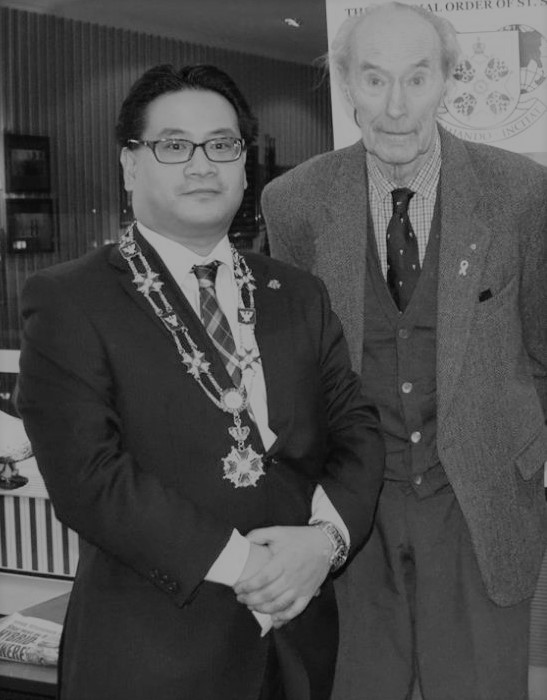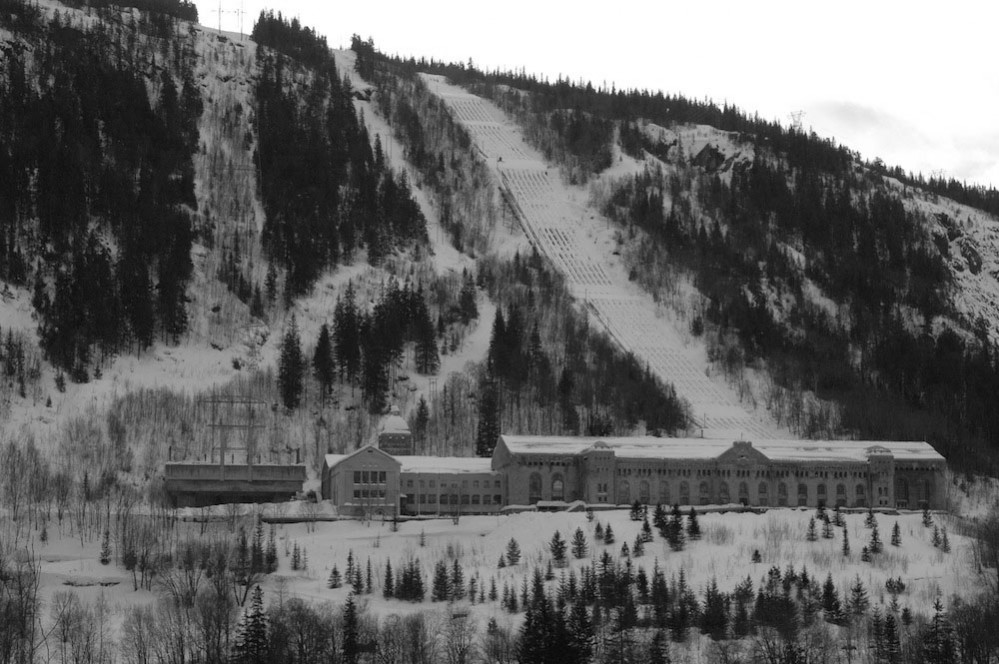We, Congratulate so much with the 98th anniversary of Joachim Holmboe Rønneberg. Last surviving war hero from the Havywater Action at Vemork
Here’s an interview we made with Joachim in December 2014.


Chevalier Rønneberg was on the 9th December 2014 kl.17: 00 appointed as Honorary Knight. The appointments happened at Rica Park Hotel in Ålesund in the Polarbjørn meeting room, on the ninth floor overlooking Ålesund.
Chevalier Rønneberg was born in Borgund, in Ålesund as the second son of Alf Rønneberg from Ålesund and Anna Krag Sandberg. He was the brother of Erling Rønneberg, who was a well-known resistance member too, having received British commando training.
On the maternal side he was a nephew of Ole Rømer Aagaard Sandberg, and thus a grandnephew of Ole Rømer Aagaard Sandberg, Sr. On the paternal side he was a distant descendant of Carl Rønneberg, and a grandnephew of politician Anton Johan Rønneberg, whose mother was a part of the Holmboe family—hence Joachim’s middle name.
Therefor it’s important that everyone understand that peace and freedom is not obvious, and this is important that today’s youth understand this. Too many take today freedom for granted.
Peace and freedom must be fought for every day
Joachim H. Rønneberg, 9th December 2014

When World War II broke out when Chevalier Rønneberg was a young adult, and Norway was occupied by Germany from April 1940. He joined Norwegian Independent Company 1 (NOR.I.C.1) (Norwegian: Kompani Linge) in 1941, having escaped Norway by boat to Scotland the same year. He received military training in the United Kingdom, and held the rank of Second Lieutenant.
The Heavy water sabotage:
The Vemork hydroelectric plant in 1935. The heavy water was produced in the front building (the Hydrogen Production Plant).
Chevalier Rønneberg, now a First Lieutenant, led the six-man Operation Gunnerside team, reinforcing the five-man team Grouse sent in earlier, during the heavy water sabotage action. After landing at a location 45 kilometres (28 mi) from the other team Gunnerside spent five days waiting out an intense blizzard in an uninhabited hunting cabin before meeting up with Grouse. The combined Norwegian team went into action against the Norsk Hydro heavy water production plant in Vemork, Norway in 1943, parachuting into the Hardangervidda plateau on 16 February.
Chevalier Rønneberg led the demolition team when the saboteurs, on the night of 27/28 February 1943, entered the Norsk Hydro plant and set explosive charges. The team then escaped from the factory as the explosives went off, without the German guards discovering the saboteurs or indeed noticing that there had been an attack on the plant, probably believing that the heavy snow had set off one of their own land mines. Although chased by 2,800 German troops five of the saboteurs, led by Chevalier Rønneberg escaped safely to neutral Sweden by way of a 14-day march over a distance of 400 kilometres (250 mi) after the successful completion of their mission.
The six other members of the sabotage team hid out in various locations in Norway without being caught by the Germans. Eighteen heavy water cells and around 500 kilograms (1,100 lb) of heavy water was destroyed during the attack, as well as a loss of production of 400 kilograms (880 lb) of heavy water.
After the factory was reported to have been rebuilt in the summer of 1943 a new saboteur attack was planned, but eventually scrapped in favour of an air strike. On 16 November 1943 161 United States Army Air Forces B-17 and B-24 heavy bombers attacked the Vemork heavy water plant, and another 12 bombers the nitrogen plant at nearby Rjukan.
The attack had not been cleared with the Norwegian government in exile in London and led to a diplomatic crisis between the Norwegian and other Allied governments. Of particular concern for the Norwegian government was the targeting of the Rjukan nitrogen plant, as it supposedly only produced products for Norwegian agriculture.
Twenty-one civilian lives were lost in the bombing raid. Following the bombing raid the Germans decided to move the production to Germany, leading to the British War Cabinet to order Norwegian saboteur Knut Haukelid to sink the Norwegian ferry SF Hydro carrying the containers of heavy water across Lake Tinnsjø. The ferry was sunk with hidden explosives on 19 February 1944, going down with 15,000 litres (3,300 imp gal) of heavy water and killing 14 Norwegian civilians, ending the struggle for the Norwegian heavy water.
Chat with the war hero Joachim Holmboe Rønneberg:
The Grand Master: It is impressive that you have started on your 96 years Joachim.
Chevalier Joachhim: Yes, I have been fortunate with a good health
The Grand Master: What did you think when you was standing on the mountainside and looking down on the Factory?
Chevalier Joachhim: Before the attack we stayed on Hardangervidda, and we took into the well-guarded building after climbing down into a river gorge and up again on the other side. We came into heavy water plant and attached explosives, while the other kept watch. We were not discovered and escaped the same way we had come, we managed blown up the plant and the heavy water that would be used for a Nazi atomic bomb was destroyed.
It was a harmful climbing, but the most critical during the operation was crossing the gorge where the river flows Måna. Those who had grown up in Rjukan believed Månajuvet was impossible to cross. It thought the Germans too, so they just kept guard on a suspension bridge that went over to the factory.
Professor Leif Tronstad had participated in the planning of heavy water plant before the war. Now he was a member of the Linge, set in England, and planned action.
Tronstad meant it was possible to cross the gorge, and thus it was that we had to cross the gorge. The climb down the steep and icy mountainside was dramatic, but all Lingemen fared.
We saw this as a regular job, with this as the setting that everyone had, and the job had to be done and the difficulties had to be defeated. What happened back in 1943 was so intense so I can remember it like it was yesterday
The Grand Master: Was you not afraid?
Chevalier Joachhim: No, really, I was not scared, but it was because it was a thought through decision of my willingness to participate in a liberation struggle of Norway where one could lose your life. The most important decision I took during the war was that I decided to enrol me to serve and fight against Nazis.
After this, all tasks and sabotage assignment that as assigned to you was just a regular job that had to be done. It was then subordinate that it was dangerous
The Grand Master: What do you think about war and misery that happens in the world today?
Chevalier Joachhim: When one looks war and misery in newspapers on television and hear about it on the radio. War we have today even in Europe. Therefor it’s important that everyone understand that peace and freedom is not obvious, and this is important that today’s youth understand this. Too many take today freedom for granted. Peace and freedom must be fought for every day, it is not something that comes by itself and you do not know what you have until you lose it
The Grand Master: What do you think that you are the only surviving war hero from your team?
Chevalier Joachhim: It is very strange, and as I said initially, I have been fortunate with my health. However, it is strange to think that I am the only one left from my team. I remember those who were on my team. They did a fantastic job. After we were done with the job we all got medals for our efforts. It was not as it was often with a warship, where only the captain got a medal. Here were we all was given a medal and we were all referred to as heroes.
Therefore, I must also say again thank you for this honour, which I will share with all the others who are not here anymore. It was a surprise and thanks.
The Grand Master: It is impressive that you do not have to solve a single shot in this sabotage operation.
Chevalier Joachhim: Yes, it was so intense so I can remember it like it was yesterday.
The Grand Master: Can you say something about what you remember after you were done with the sabotage?
Chevalier Joachhim: The operation went as an adventure, we spent all night down in the valley, but when we got up the mountain, got on our skis, and went into the mountain. As the situation was our impression, there was no trace of us some places that could expose us and tell the Germans where we came from. It then lay in front of us was a very long skiing. There, we reasoned that it should we clear, when we clearly had done so good so far. We went skiing for more than two weeks before we came over to Sweden and from there back to England.
Before we started the campaign, we were aware that this could possibly become a one-way trip. However, it was not what we planned for. Everything was thoroughly planned, also the route we followed to Sweden. Several of the problems we had predicted did not appear. It went better than expected.
The Grand Master: Thanks Joachim, it has been an honour and pleasure to meet you. Your story is impressive and must never be forgotten.
Chevalier Joachim: Thank you!
